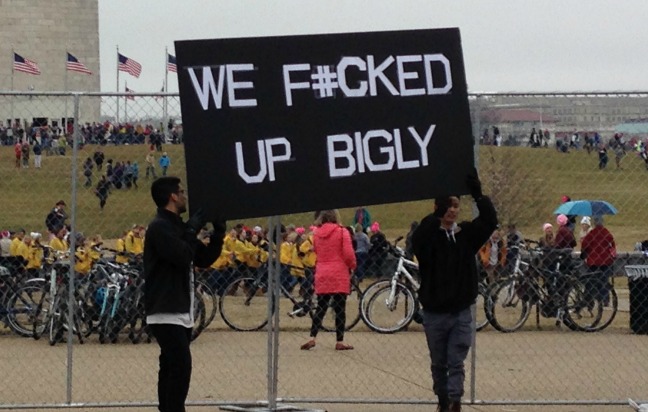World events conspired to start squeezing middle- and working-class Americans in the 1970s, but it was in the following decade of the Reagan Revolution that the games truly began in earnest. The air-traffic controllers got the boot first, but the point of the toe soon came for the rest of us.
Unions, consumer protections and financial regulation headed in the wrong direction for most, and globalization and automation added more layers of pressure. The markets were celebrated over all else. Corporations became “people.”
The current rise of the Gig Economy, that Libertarian wet dream about “freedom” or some such bullshit, is just the supersized version of what we’ve been experiencing. The elevator only goes down.
Noah Smith rightly calls out the plague effect of neo-liberalism in a Bloomberg View column, detailing how many of those who supported politicians selling a bill of goods ended up getting hurt the worst. The most recent election would appear to be the coup de grâce. Trump isn’t the advent of a new con job but the culmination of the decades-old one.
As Smith writes, “there won’t be a quick fix for middle-class boomers and Gen Xers.”
An excerpt:
It wasn’t supposed to turn out this way. Back in the 1980s and 1990s, middle-class Americans looked forward to a future of wealth and leisure. If you were a small business owner, or an engineer, or a lawyer at a small firm, you might not have expected to be rolling in it, but you probably didn’t think things would go so badly awry.
Who’s responsible? Who took your prosperity? Donald Trump’s trade adviser Peter Navarro might tell you it was China, while his political aide Steve Bannon might tell you it was immigrants. Free-market think-tank types might tell you it was government regulation, while conservative lawmakers might tell you it was single moms on welfare or lazy people on food stamps. But these answers are mostly or completely wrong.
One partially correct answer is that your prosperity was taken by the very people who promised to ensure and enhance it. The decades from 1980 through 2008 were the age of neoliberalism — the ideology of the free market. Financial deregulation, tax cuts and a lax attitude toward consumer protection and antitrust were supposed to free the entrepreneurial potential of the American middle class. And to some degree it did — those decades saw plenty of wealth creation, and the U.S. economy performed a bit better than most rich nations in Europe and East Asia.
But along with real productivity, the neoliberal age saw plenty of grift and middle-class wealth extraction. In the book, Phishing for Phools: The Economics of Manipulation and Deception, Nobel prize-winning economists George Akerlof and Robert Shiller said that all free-market economies are accompanied by some amount of consumer error, simply because sellers are always exploring every possible method of parting people from their money.•
Tags: Noah Smith

